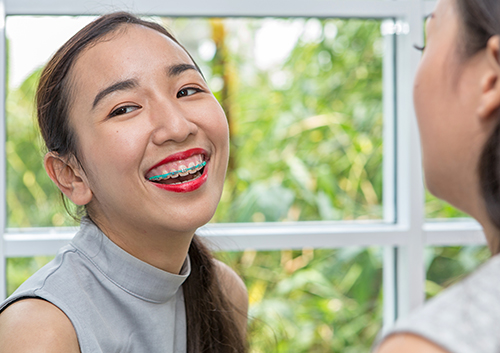Toothbrush Science
October 6th, 2021

Let’s talk science! From the vastness of the cosmos to sub-atomic particles, science helps us understand the world around us and how it works. So, let’s take some familiar scientific fields of study and apply them to your toothbrush.
My toothbrush?
Yes, indeed! When it comes to your oral health, your toothbrush is the first line of defense, so understanding how and why it works so well might help us use this handy tool even more effectively.
Biology—the study of living organisms
Unfortunately for your toothbrush, the living organisms we’re talking about here are the bacteria which cause tooth decay and those which can lead to illness. How do these problems arise, and how do we prevent them?
Fight Plaque
Plaque is the sticky film that builds up on teeth, and millions of oral bacteria help make up this biofilm. These bacteria convert sugars and other carbohydrates in the foods we eat into acids. And these acids erode our tooth enamel, leading to tooth decay. (More on this when we get to Chemistry.) The best ways to get rid of plaque?
- Brush often. The recommended minimum is two minutes of brushing twice a day, but when you’re having orthodontic work done, it’s even more important to banish the plaque that can stick to your braces or inside aligners. Ask us what brushing schedule is best for you.
- Try an electric toothbrush. For some people with braces, cleaning the teeth is easier and more thorough with an electric brush.
- Replace your brush regularly. Brushes become worn and frayed after three or four months, and you won’t be brushing as effectively.
Stop Germs from Spreading
- Don’t share. Sharing toothbrushes can lead to an increased risk of colds and infections.
- Rinse thoroughly after brushing, making sure you remove any toothpaste or debris left after you brush.
- Store the brush upright and let it air-dry. Covering the brush or keeping it in a closed container can promote the growth of bacteria more easily.
- Keep different brushes separate when they’re drying to avoid cross-contamination.
- Replace your brush regularly!
Chemistry—the study of what makes up substances, their properties, and how they interact
When it comes to improving your brushing chemistry, the best thing you can do for your toothbrush is to put a dab of fluoride toothpaste on it! Why fluoride? Let’s look at the chemistry of tooth enamel.
Tooth enamel is the strongest substance in our bodies—even stronger than bone. But it is not indestructible, and acidic substances can dissolve the mineral bonds which give our enamel its strength, whether they come from the bacteria in plaque or are found in our favorite foods and drinks (sodas, coffee, tomatoes, and citrus are among the tasty, but acidic, culprits).
The enamel in our teeth contains calcium and phosphate ions, minerals which help make it the strongest substance in our bodies. But when the level of acidity in our mouths becomes too high, these minerals begin to dissolve. Eventually, teeth become pitted, bacteria can penetrate more deeply, and decay is the result.
So what can we do? While our saliva helps neutralize acidity naturally, and we can cut back on acidic foods in our diets, using fluoride toothpaste actually helps restore the strength of our enamel in a process known as “remineralization.”
Fluoride works on the surface of enamel to both attract and anchor calcium ions, reducing mineral loss and strengthening the weakened enamel. Fluoride also interacts with the calcium and phosphate compound to create a new compound that is even stronger and more acid-resistant.
When you brush with fluoride toothpaste, you help replace and restore the mineral composition of your enamel—and there’s evidence that fluoride might even interfere with oral bacteria’s ability to produce acid. Now that’s good chemistry!
Physics—the study of matter and energy and their interactions
The matter here is your tooth enamel, and the energy is the force you use when brushing. And this is one time the force should not be with you.
- Over-vigorous brushing can not only damage your brackets, but can also irritate delicate gum tissue and wear down enamel. A “sawing” back-and-forth motion is both hard on your enamel and misses plaque and debris between the teeth. We’ll be happy to show you the safest and most effective way to brush with braces. Just remember, “Massage, don’t scrub.”
- A soft toothbrush is almost always your best option when you use a manual brush, but if you’re still a heavy-handed brusher, or have sensitive teeth and gums, consider an electric model. An electric toothbrush should provide a continuous brushing motion without needing any heavy pressure from the brusher. Some models will even let you know when you are brushing too hard.
Brushing harder is not brushing better, and your teeth, gums, and braces will be heathier with careful brushing habits. If you need tips on brushing with braces, contact our Langley office and ask!
There’s a lot of science in the simple act of brushing, but we don’t need to spend hours studying to get a passing grade in dental health. The things you do normally—brushing at least two minutes twice a day, using fluoride toothpaste, and applying proper brushing technique—will help create a smile which will earn you top marks from Dr. Cronin for a lifetime!




